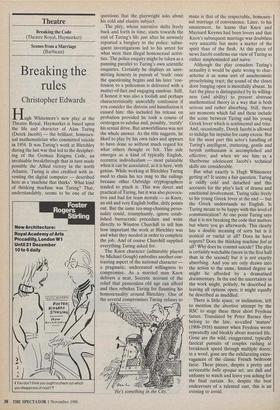Theatre
Breaking the Code (Theatre Royal, Haymarket) Scenes from a Marriage (Barbican)
Breaking the rules
Christopher Edwards
Hugh Whitemore's new play at the Theatre Royal, Haymarket is based upon the life and character of Alan Turing (Derek Jacobi) — the brilliant, homosex- ual mathematician who committed suicide in 1954. It was Turing's work at Bletchley during the last war that led to the decipher- ing of the German Enigma Code, an invaluable breakthrough that in turn made possible the Allied victory in the north Atlantic. Turing is also credited with in- venting the digital computer — described here as a `machine that thinks'. What kind of thinking machine was Turing? That, understandably, seems to be one of the questions that the playwright asks about his cold and elusive subject.
The play, whose narrative shifts freely back and forth in time, starts towards the end of Turing's life just after he unwisely reported a burglary to the police: subse- quent investigations led to his arrest for what were then illegal homosexual activi- ties. The police enquiry might be taken as a punning parallel to Turing's own scientific enquiries. Certainly he displays an unre- mitting honesty in pursuit of 'truth' once the questioning begins and his later 'con- fession to a policeman is delivered with a matter-of-fact and engaging candour. Still, if honest it was also a foolish and perhaps characteristically unworldly confession if you consider the distress and humiliation it caused him: this included his release on probation provided he took a course of oestrogen to subdue and, possibly, `rectify' his sexual drive. But unworldliness was not the whole answer. As the title suggests, he liked to play by his own rules and appears to have done so without much regard for what others thought or felt. This side emerges as a kind of typically English, eccentric individualism — most palatable when it can be associated, as it is here, with genius. While working at Bletchley Turing used to chain his tea mug to the railings because other Oxbridge cryptographers tended to pinch it. This was direct and practical of Turing, but it was also provoca- tive and bad for team morale — as Knox, an old and very English boffin, drily points out. But the same tea-mug-chaining perso- nality could, triumphantly, ignore estab- lished bureacratic procedure and write directly to Winston Churchill to tell him how important the work at Bletchley was and what they needed in order to complete the job. And of course Churchill supplied everything Turing asked for.
The Knox character (admirably played by Michael Gough) embodies another con- trasting aspect of the national character a pragmatic, understated willingness to compromise. As a married man Knox delivers a neat, Socratic account of the relief that passionless old age can afford and then rebukes Turing for flaunting his homosexuality around Bletchley. One of the several compromises Turing refuses to We's something in the City.' make is that of the respectable, homosex- ual marriage of convenience. Later, to his amazement, he learns that Knox and Maynard Keynes had been lovers and that Knox's subsequent marriage was doubtless very amicable but more a matter of the spirit than of the flesh. At this piece of news Jacobi confirms our view of Turing as rather simpleminded and naive.
Although the play considers Turing's sexuality it would be quite wrong to char- acterise it as some sort of anachronistic proselytising tract; the sound of the closet door banging open is mercifully absent. In fact the piece is distinguished by its willing- ness (and ability) to present abstruse mathematical theory in a way that is both serious and rather absorbing. Still, there are moments which fail and these include the scene between Turing and his young Greek lover which is sentimental and trite. And, occasionally, Derek Jacobi is allowed to indulge his impulse for camp excess. But for the most part this actor's handling of Turing's intelligent, stuttering, gentle and boyish enthusiasm is accomplished and effective; and when we see him as a Sherborne adolescent Jacobi's technical skills are considerable.
But what exactly is Hugh Whitemore getting at? It seems a fair question. Turing is oddly cold and detached and this accounts for the play's lack of drama and emdtional involvement. Turing talks freely to his young Greek lover at the end — but the Greek understands no English. Is Turing meant to be happy with this level of communication? At one point Turing says that it is not breaking the code that matters but where you go afterwards. This clearly has a double meaning of sorts but is it ironical or rueful at all? Does he have regrets? Does the thinking machine feel at all? Why does he commit suicide? The play is certainly watchable (more in the first half than in the second) but it is not exactly absorbing. And you are only drawn into the action to the same, limited degree as might be afforded by a dramatised documentary. In the end the uncertainty in the work might, politely, be described as leaving all options open; it might equally be described as muddled.
There is little space, or inclination, left to mention the abortive attempt by the RSC to stage these three short Feydeau farces. Translated by Peter Barnes they belong to the late, so-called 'mature' (1908-1916) manner when Feydeau wrote repeatedly and bleakly about married life. Gone are the wild, exaggerated, typically farcical pursuits of couples rushing at breakneck speed through multiple doors; in a word, gone are the exhilarating extra- vagances of the classic French bedroom farce. These pieces, despite a pretty and serviceable belle epoque set, are dull and unfunny to watch and leave you aching for the final curtain. So, despite the best endeavours of a talented cast, this is an evening to avoid.


















































 Previous page
Previous page